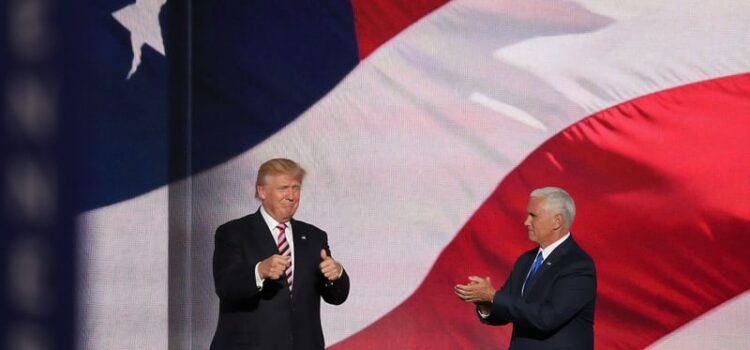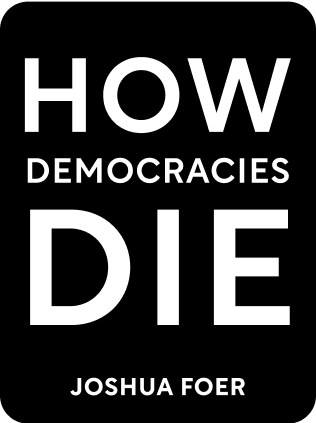

This article is an excerpt from the Shortform book guide to "How Democracies Die" by Steven Levitsky and Daniel Ziblatt. Shortform has the world's best summaries and analyses of books you should be reading.
Like this article? Sign up for a free trial here .
What’s the relationship between Trump and the GOP? How did the failure of the GOP lead to Trump’s nomination and eventual presidency?
Trump and the GOP didn’t always see eye to eye, but the GOP failures in gatekeeping are what allowed Trump to be nominated in the first place. The GOP chose party over country and allowed Trump’s nomination despite obvious fascist and authoritarian tendencies.
Read more about Trump and the GOP below.
Trump in the GOP Shows How Democracy Failed
The Trump campaign launched at a point in history where the Republican Party as an institution was in the weakest possible position to stop him from getting real traction and possibly capturing the nomination. We need to explore the specific ways in which the Republican Party failed to exercise its role as a gatekeeper. In general, the inability to stop Trump can be attributed to three distinct Republican Party shortcomings:
- The failure of party elites
- The new nomination rules
- The decision to support Trump over Hillary Clinton in the general election
This shows us how an authoritarian demagogue rose to the top of the American political system thanks to the inability and unwillingness of a major party to exercise its proper gatekeeping function.
Failure of Party Elites
One of the most important aspects of the invisible primary is the winning of endorsements from party elites. These endorsements send a signal to donors and voters that a candidate is serious and worthy of support. On this score, Trump failed miserably. He secured no major endorsements before the Iowa caucuses on February 1 and picked up hardly any even after winning early primaries and emerging as a clear frontrunner.
But the lack of endorsements turned out not to matter much at all. Trump had assets as a candidate that were far more valuable than endorsements. He had the loyalty of influential right-wing media figures like Sean Hannity, Ann Coulter, and the popular website Breitbart News. Combined with his high name recognition, this enabled him to communicate with his supporters directly, get his message out, and earn far more coverage than high-profile endorsements or campaign donations ever could.
Trump also excelled at generating enormous quantities of free coverage in the mainstream media (as opposed to paid campaign ads). He achieved this thanks to 1) being a major celebrity before he launched his campaign and 2) generating controversy—and thus, coverage—through outlandish and extreme statements. In effect, the media system rewarded him for his extremism. One study done after the election showed that Trump’s antics generated approximately $2 billion worth of free media coverage—something that all the endorsements in the world couldn’t buy.
Constrained by Nomination Rules
Thus, boosted by name recognition and an uncanny ability to generate media coverage through extreme statements, Trump emerged as the clear frontrunner for the nomination, to the shock of many GOP insiders. Some party activists organized plots to change the rules at the convention to “unbind” delegates and let even those pledged to Trump vote instead for another candidate on the first ballot. These plans, however, came to nothing and were never seriously attempted.
This was because the fundamental rules of the process made denying Trump the nomination an impossibility. GOP voters, with whom Trump was enormously popular, had chosen him as the nominee and party leaders lacked any real mechanism to stop him. As elected officials, they would risk their own political careers and antagonize their own voters if they attempted to wrest the nomination away from him.
Standing With Trump Vs. Standing for Democracy
When it comes to Trump and the GOP, the final failure of the GOP to stop Donald Trump came in the general election against Hillary Clinton. By this time, it was obvious to most observers that Trump was a deeply abnormal and authoritarian candidate.
If we look at the warning signs from Chapter 1 to identify authoritarians, we see that Trump satisfied all four criteria:
- He rejected the rules of normal democratic competition by accusing the Democratic Party of using illegal immigrants to perpetrate a massive voter fraud scheme and indicated that he would not accept the results of the election if he lost.
- He denied the legitimacy of his political opponents with his embrace and spread of birtherism (the conspiracy theory alleging that President Barack Obama was not born in the United States), and his calls for Hillary Clinton to be imprisoned.
- He openly encouraged violence at his rallies, on several occasions even offering to pay the legal fees of supporters who beat up anti-Trump protestors.
- He advocated the curtailing of the civil liberties of his opponents with his promises to appoint a special prosecutor to investigate Clinton and his announced intention to change libel laws to make it easier to sue journalists who criticized him.
Such a figure becoming the nominee of a major political party was an unprecedented development in American politics. GOP leaders thus faced a choice in the general election: to stand with Trump or to stand for democracy.
Party Over Country
Unfortunately, when faced with this choice, GOP leaders chose to stand with Trump, putting their narrow partisan interests over their responsibility as democratic gatekeepers. Trump and the GOP were now co-conspirators.
Prominent GOP leaders could have made the opposite choice—to cross party lines and support Trump’s Democratic rival, Hillary Clinton. While such a move wouldn’t have shifted every Republican voter to support Clinton, it would have likely had a significant impact, sending a clear signal to the electorate that there was broad, bipartisan agreement on Trump’s unfitness for office.
But, crucially, high-profile Republicans did not do this. Republican elites chose party over country and democracy in 2016.

———End of Preview———
Like what you just read? Read the rest of the world's best book summary and analysis of Steven Levitsky and Daniel Ziblatt's "How Democracies Die" at Shortform .
Here's what you'll find in our full How Democracies Die summary :
- How shared norms are essential for preserving democracy
- Why the Trump presidency threatened those shared norms
- Why democracy goes beyond individual leaders and parties and must be a shared enterprise among committed individuals






